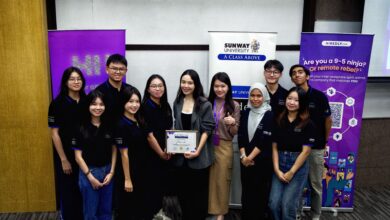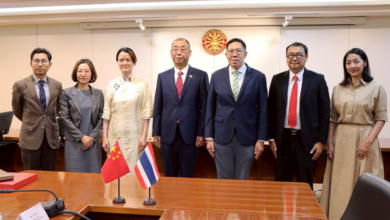Thammasat University Launches New Education Strategy to Go Global and Develop Well-Rounded Talent

TU Transformed into a Global Impact University, Integrating Science, Humanities, Society, and AI, While Pioneering the Model of a Holistic University for the Future
Thammasat University (TU) has unveiled a forward-thinking strategic plan of the 21st century to usher in a new era of higher education under the theme ‘Leading Comprehensive University for Future Societies’. The university aims to overhaul and reform its learning system, updating 298 academic programmes across 19 faculties, 6 colleges, and 2 institutes. These revised curricula will foster interdisciplinary learning in social sciences, science and technology, and health sciences. TU determined to become a national model for producing both ‘leaders’ and ‘high-quality professionals’ who are well equipped to meet diverse workforce demands. New and emerging courses will include Ethics of Artificial Intelligence for Future Leaders and modules in Finance & Investment that respond to the shifting of lifestyle, society, and economy. TU’s goal is to develop graduates equipped with hard skills, and soft skills —ensuring 100% employability upon graduation.
Prof Dr Supasawad Chardchawarn, Rector of Thammasat University, stated that in a world undergoing rapid transformation, universities must act with urgency to prepare graduates for the future. According to the World Economic Forum’s 2024 Report, analytical thinking was identified as the most in-demand skill for 2025 (68%), followed by resilience, flexibility and agility (67%) and leadership and social influence (61%). These findings reinforce the need to develop students’ thinking, communication, and adaptability in a volatile world.
Simultaneously, tech-related careers are booming between 2025 and 2030—particularly roles such as Big Data Specialists, with projected growth exceeding 100%, as well as FinTech Engineers and AI/Machine Learning Specialists. Other rapidly expanding roles include app developers, data analysts, cybersecurity experts, and renewable energy engineers. In contrast, many traditional careers are in clear decline, underlining the urgency for upskilling, especially in technology, creativity, and lifelong learning.
Prof Dr Supasawad added that TU is committed to elevating Thai higher education to a global level. Its new strategy, grounded in the concept of being a Leading Comprehensive University for Future Societies, also targets the transformation of TU into a Global Impact University. The revamp of over 298 programmes will span social sciences, science and technology, and health sciences—developing well-rounded, practically skilled, and ethically grounded graduates who are ready to lead and serve society today and in the future.
The strategy is built on three main pillars:
1) Becoming a Leading Comprehensive University of the Future – Emphasising interdisciplinary knowledge and advanced research skills aligned with modern learning models.
2) Becoming a University for Society – Focusing on producing public-minded graduates while connecting with communities through innovation for well-being and sustainable development.
3) Ensuring Happiness and Sustainability for the TU Community – Through sustainable management systems and structural reforms that prioritise Outcome-Based Education (OBE), enhancement of hard and soft skills, and widespread adoption of Experiential Learning and Co-operative Education across all faculties.
“Our new strategic plan is centred on interdisciplinary learning, experiential learning, and co-creating curricula in collaboration with the business sector,” said Prof Dr Supasawad. “Curriculum reform began in the 2024 academic year and is scheduled for full implementation by 2027. Programme structures are being designed in line with OBE (Outcome-Based Education) principles, including both course-level and subject-level learning outcomes per the standards of the Office of the Higher Education Commission (OHEC). Students will engage in over 405 hours of hands-on training in real-world settings, with an emphasis on experiential learning via field-based projects—ensuring graduates are truly job-ready.”
Moreover, all programmes will promote partnerships with government agencies, private sector organisations, major corporates, and technology firms. TU will also elevate e-learning offerings and establish a common core across faculties for shared curricular benefits. English language proficiency and alignment with the Sustainable Development Goals (SDGs) are also being integrated to prepare Thai graduates for international competitiveness.
A major highlight of the reform is the launch of a newly required module, TU280: Artificial Intelligence Ethics for Leaders of the Future, designed to reflect global trends in AI and advanced technologies. This compulsory course aims to instil a deep understanding of ethics, technology, and responsible AI usage, while cultivating ethical leadership. “What makes this course unique,” Prof Dr Supasawad noted, “is that it goes beyond how to use technology. It trains students to question the role of AI in human life, society, and the economy, preparing them to be thoughtful, accountable global citizens—ethical leaders in the age of AI.” The course is scheduled to launch in the 2025 academic year and will be taught by TU’s leading AI faculty and specialists.
In addition, TU is introducing Finance & Investment modules covering essential topics for the next generation, including personal finance, cryptocurrency, tax planning, opportunity costs, and sustainable finance. These modules have been co-designed with experts from leading institutions such as the Stock Exchange of Thailand (SET), SCB, GULF, and Bangkok Bank. Delivered through flexible online or e-learning platforms, the courses are designed to complement students’ core academic work. Since the launch of SET E-learning in 2022, more than 22,000 students have enrolled in related courses by March 2025.
To prepare graduates for the workforce, TU emphasises the development of critical professional skills, including: Hard skills – e.g. computer literacy, legal knowledge, and financial competence; Soft skills – e.g. communication, problem-solving, and leadership; and Adaptability skills – e.g. flexibility, teamwork, and risk analysis. At the same time, specialised competencies are also being promoted, such as AI ethics and cross-cultural collaboration. TU aims to nurture distinct talents capable of navigating an increasingly complex and dynamic global landscape.
“Our overarching goal is to produce graduates with both academic knowledge and practical experience. Every student will be required to complete at least six credits through projects, internships, or professional training. All programmes are expected to foster students’ future-ready skills and help them thrive in the new world of work,” said Prof Dr Supasawad.
TU has also established the Thammasat University Co-operative Education and Career Development Centre (TUCEEC) to help both students and alumni build necessary hard, soft, and future skills—especially in AI and digital marketing. The university plans to host more than 100 training programmes and activities between 2025 and 2027 to ensure 100% employment rates upon graduation.
In terms of faculty development, TU is enhancing the capabilities of its academic staff to become ‘learning leaders’ under the Professional Standards Framework (PSF)—a global benchmark for excellence in higher education teaching. The university aims for at least 100 lecturers to attain PSF Level 2 or higher by 2027. This initiative is key to fostering a new generation of proactive, learner-centred educators capable of designing learning experiences tailored to modern learners. It also supports the development of international and dual-degree programmes with global partners, building a truly borderless academic network.
“In recent years, Thammasat has become a destination for learners of all ages and backgrounds. This compels us to broaden our curriculum to meet ever-diversifying needs and focus on producing high-quality graduates in an era of declining global birth rates,” Prof Dr Supasawad concluded. “We hope to serve as a model for holistic development in higher education and lifelong learning, ultimately contributing to national advancement in all dimensions.”




